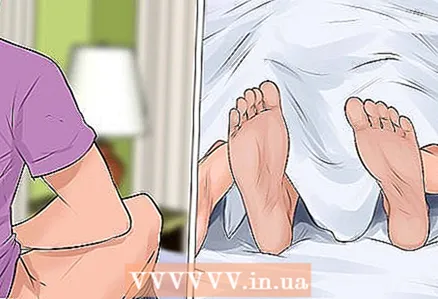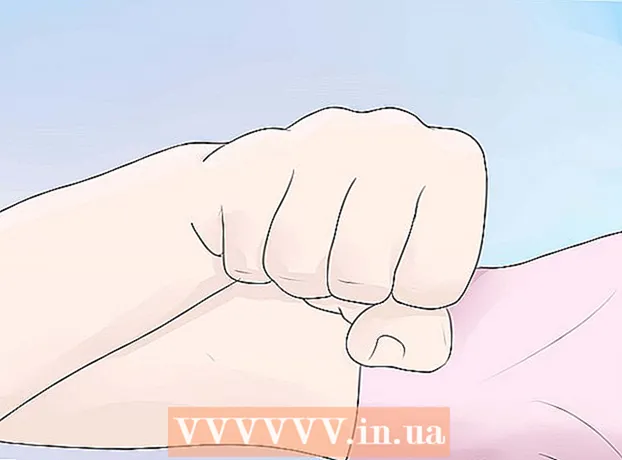
Content
If during sex a man experiences an orgasm much faster than he and his partner would like, it is customary to talk about premature ejaculation (premature ejaculation). Among the criteria that help diagnose this condition, the onset of ejaculation immediately after the introduction of a penis into a partner and the inability of a man to delay ejaculation are usually called. On average, men ejaculate five minutes after they start intercourse. Many men in the world are faced with the problem of premature ejaculation, and this makes them feel ashamed and irritated. Some men even begin to avoid sexual intercourse because of this. Do not despair! This problem can be solved by contacting a psychotherapist, starting to perform certain techniques to delay ejaculation, or resorting to medication. You will cope with the problem and can again enjoy sex with your partner.
Steps
Method 1 of 2: Applying Behavioral Techniques
 1 Try the "stop squeeze" method. During foreplay, you and your partner can try the "stop-squeeze" method to learn to control yourself and delay the moment of ejaculation.
1 Try the "stop squeeze" method. During foreplay, you and your partner can try the "stop-squeeze" method to learn to control yourself and delay the moment of ejaculation. - Start by stimulating the penis without going into your partner. Feel the moment when ejaculation is coming.
- Ask your partner to squeeze the penis at the base of the head. The partner should squeeze the head of the penis until the pre-ejaculatory tension subsides.
- After 30 seconds, resume stimulation and, if necessary, repeat the above method to prevent ejaculation. This will help you better control yourself, and ejaculation will no longer occur immediately after the introduction of the penis into the partner's vagina.
- You can use another kind of stop-squeeze technique called the stop-start method. This method is similar to the "stop squeeze" method, but here the partner does not squeeze the penis to prevent ejaculation, you just pause and continue again.
 2 Use self-help techniques. There are several methods you can practice on your own. This will give you the opportunity to learn how to control the onset of ejaculation. Some of these techniques are:
2 Use self-help techniques. There are several methods you can practice on your own. This will give you the opportunity to learn how to control the onset of ejaculation. Some of these techniques are: - Masturbate before sex. If you plan on having sex this evening, try masturbating an hour or two before.
- Use thicker condoms to reduce stimulation during sex. Try not to use condoms that are designed to enhance male stimulation during intercourse.
- Take a deep breath when you feel ejaculation approaching. This can help stop reflex ejaculation. Also, try to switch your thoughts and think about something boring until you feel that the peak of arousal has passed.
 3 Try changing the position in which you are having sex. If you usually prefer top positions, choose positions with your partner on top. Try to have sex in a position where the woman can easily stop and move slightly away from you when you feel ejaculation approaching.
3 Try changing the position in which you are having sex. If you usually prefer top positions, choose positions with your partner on top. Try to have sex in a position where the woman can easily stop and move slightly away from you when you feel ejaculation approaching. - When you feel that the sexual tension has passed, you can continue intercourse.
 4 See a psychotherapist. Both individual work with a psychotherapist and paired psychotherapy, when you come to a specialist's sessions with your partner, can help you. Psychotherapy can be effective for the following problems:
4 See a psychotherapist. Both individual work with a psychotherapist and paired psychotherapy, when you come to a specialist's sessions with your partner, can help you. Psychotherapy can be effective for the following problems: - Performing anxiety and other stressful situations in your life.Sometimes, if a man is worried about whether he will get an erection and whether it will persist during the entire intercourse, this can lead to a rapid onset of ejaculation.
- Traumatic sexual experiences in adolescence. Many psychologists agree that if a man's early sexual experience was associated with feelings of guilt or fear of being caught during sex, this can subsequently lead to the development of premature ejaculation.
- If there are problems in your relationship with your partner, this can significantly affect the duration of intercourse. You should think about this reason if the problem of premature ejaculation has arisen for the first time and in a past relationship you have not encountered it. In this case, it will be useful for you to undergo a course of psychotherapy with your partner.
 5 Try topical anesthetics. These drugs are sold over the counter and you can buy them as a spray or cream. Apply a special product to your penis before having sex. This will help you desensitize and delay the onset of ejaculation. Some men (and sometimes their partners) have reported that the use of such drugs leads to temporary loss of sensitivity and decreased pleasure during sex. Most often, such drugs are produced on the basis of:
5 Try topical anesthetics. These drugs are sold over the counter and you can buy them as a spray or cream. Apply a special product to your penis before having sex. This will help you desensitize and delay the onset of ejaculation. Some men (and sometimes their partners) have reported that the use of such drugs leads to temporary loss of sensitivity and decreased pleasure during sex. Most often, such drugs are produced on the basis of: - Ledocaine
- Prilokaina
Method 2 of 2: Get medical attention
 1 If you have used all of the above methods, but did not achieve the desired result, see your doctor. Sometimes, premature ejaculation is a symptom of other, more serious health problems that require treatment. Possible reasons are as follows:
1 If you have used all of the above methods, but did not achieve the desired result, see your doctor. Sometimes, premature ejaculation is a symptom of other, more serious health problems that require treatment. Possible reasons are as follows: - Different forms of diabetes
- High blood pressure
- Alcohol or drug addiction
- Multiple sclerosis
- Prostatitis
- Depression
- Hormonal imbalance
- Problems related to neurotransmitters. Neurotransmitters (neurotransmitters) are chemicals that transmit signals in the nervous system.
- Pathological reflexes associated with the ejaculation process
- Thyroid dysfunction
- Infectious diseases of the prostate and genitourinary system
- Tissue damage caused by surgery or trauma (in rare cases).
- Hereditary disease.
 2 Ask your doctor about the possibility of taking a drug containing duloxetine (Simbalta, Intriv). This substance is similar in its action to antidepressants from the group of selective serotonin reuptake inhibitors (SSRIs), but this drug was developed specifically for the treatment of premature ejaculation. If your doctor prescribes this drug for you, you will need to take it one to three hours before having sex.
2 Ask your doctor about the possibility of taking a drug containing duloxetine (Simbalta, Intriv). This substance is similar in its action to antidepressants from the group of selective serotonin reuptake inhibitors (SSRIs), but this drug was developed specifically for the treatment of premature ejaculation. If your doctor prescribes this drug for you, you will need to take it one to three hours before having sex. - Do not take this drug more than once a day. Overdose can cause side effects such as headache, dizziness, and general malaise.
- This drug is not suitable for men with heart, kidney or liver problems. This medication can interact with other medications, including antidepressants.
- Alternatives include SSRIs paroxetine, sertraline, fluoxetine, and citalopram.
- The typical full effect of SSRIs (which are taken every day, not just when needed, like Dapoxetine) will not be noticeable until about two weeks after you start taking it.
 3 Talk with your doctor about other medications that can help delay the onset of orgasm. There are drugs that are not on the officially approved list of drugs used to treat premature ejaculation, but there is evidence of their effectiveness in delaying the onset of orgasm. Your doctor may prescribe these drugs for you, which you can take as needed or daily.
3 Talk with your doctor about other medications that can help delay the onset of orgasm. There are drugs that are not on the officially approved list of drugs used to treat premature ejaculation, but there is evidence of their effectiveness in delaying the onset of orgasm. Your doctor may prescribe these drugs for you, which you can take as needed or daily. - Other antidepressants.You may be prescribed other antidepressants from the serotonin reuptake inhibitor group, such as setralin (Zoloft), paroxetine (Paxil), fluoxetine (Prozac), or tricyclic clomipramine (Anafranil). Possible side effects of these drugs include nausea, dry mouth, dizziness, and decreased interest in sex.
- Tramadol. This drug is used as a strong pain reliever. Other side effects of tramadol, including nausea, headache, and impaired coordination, include prolonged intercourse and delayed ejaculation. In Russia, this drug is included in the list of narcotic substances, and its circulation is strictly regulated by the State Drug Control Service. For this reason, your doctor will not be able to give you a prescription for this drug.
- Phosphodiesterase type 5 inhibitors. These drugs are commonly used to treat erectile dysfunction. Such substances include sildenafil (Viagra and Revazio), tadalafil (Cialis), and vardenafil (Levitra). Side effects include headache, skin redness, blurred vision, and nasal congestion.



